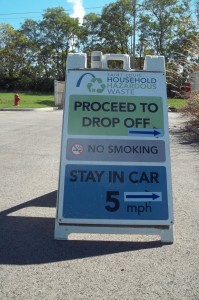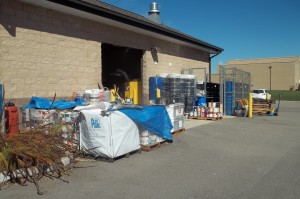Here is a question I received almost a year ago on December 17, 2015 from a person who found me while searching the internet for an answer to his questions:
 Daniel, hope this finds you well. Could you give me your opinion on waste disposal companies using ORM-D for Household Hazardous Waste (HHW) shipping names (e.g. flammable paint, cleaners that may have low or high pH and others that may fit into DOT respective hazard classes). I am concerned as the material is no longer packaged according to the original ORM-D packaging. Are you familiar with any US DOT interpretation that would allow that those shipping names continue to be used? My concern comes from reviewing a waste disposal company that is still using ORM-D shipping names. Thanks for input and thoughts. Wish you a Merry Christmas, Thanks.
Daniel, hope this finds you well. Could you give me your opinion on waste disposal companies using ORM-D for Household Hazardous Waste (HHW) shipping names (e.g. flammable paint, cleaners that may have low or high pH and others that may fit into DOT respective hazard classes). I am concerned as the material is no longer packaged according to the original ORM-D packaging. Are you familiar with any US DOT interpretation that would allow that those shipping names continue to be used? My concern comes from reviewing a waste disposal company that is still using ORM-D shipping names. Thanks for input and thoughts. Wish you a Merry Christmas, Thanks.
Well, it took me a few days. But just before Christmas (12.22.15), I replied:
I apologize for my delay in replying to your question. I’ll do my best to answer it below.
- Waste collected from households is excluded from regulation as a hazardous waste at 40 CFR 261.4(b)(1). See this short presentation for more information: The Household Hazardous Waste Exclusion.
- Due to the HHW exclusion, the waste does not require a Uniform Hazardous Waste Manifest when transported or offered for transportation by the Shipper/Generator.
- USDOT/PHMSA regulations define a hazardous waste as a waste that requires the Uniform Hazardous Waste Manifest when transported. Therefore, excluded HHW is not a hazardous waste per USDOT/PHMSA regulations.
- As you describe, the excluded HHW may be a USDOT/PHMSA hazardous material for other reasons, e.g. Class 3 Flammable, Class 8 Corrosive, &etc.
- Hazardous materials that meet the requirements of the Consumer Commodity exception may be re-classified as an ORM-D and shipped accordingly. Read more about the Consumer Commodity Exception in this short article.
- Use of the Consumer Commodity Exception for an excluded HHW does require compliance with specified packing instructions but it does not require the original packaging.

In sum, if the Shipper/Generator is complying with the HHW exclusion and the Consumer Commodity Exception, then they should be able to ship the waste as a Consumer Commodity.

